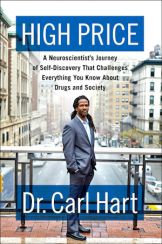 Sadly, the issues Carl Hart discusses in High Price, his memoir-cum-manifesto about drugs and drug policy in America, have been much in the news lately after the death of the actor Philip Seymour Hoffman. Hart is a professor of neuroscience at Columbia who studies the neuropsychology of drug addiction. He also grew up in working-class and poor African-American neighborhoods in Miami and saw firsthand the social effects of both drugs and drug policies on his family and friends. The book is an unusual but not unwelcome mix of personal reflection and scientific information about drugs and addiction drawn both from Hart’s own work and previous studies. It’s an ambitious project, and I think he pulls it off adequately, but part of me wished that he had written a spectacular book rather than a good one, since the ideas it advances are so pertinent and necessary.
Sadly, the issues Carl Hart discusses in High Price, his memoir-cum-manifesto about drugs and drug policy in America, have been much in the news lately after the death of the actor Philip Seymour Hoffman. Hart is a professor of neuroscience at Columbia who studies the neuropsychology of drug addiction. He also grew up in working-class and poor African-American neighborhoods in Miami and saw firsthand the social effects of both drugs and drug policies on his family and friends. The book is an unusual but not unwelcome mix of personal reflection and scientific information about drugs and addiction drawn both from Hart’s own work and previous studies. It’s an ambitious project, and I think he pulls it off adequately, but part of me wished that he had written a spectacular book rather than a good one, since the ideas it advances are so pertinent and necessary.
Let me explain: everything about this book is fascinating – Hart’s description of his youth and his scientific gloss on the psychological phenomena at work that he now understands; the empirical information about drug addiction that contradicts most of our dominant stereotypes about it; and his political prescriptions for correcting decades of failed drug policy in the United States. The combination of this material makes for one of the most unique and interesting memoirs I’ve ever read. The problem is that in his ambition to retain an authentic voice, Hart wrote the book largely by himself (as far as I can tell). He mentions and thanks a writer with whom he worked to shape the narrative, but she is not listed as a co-author and, judging by the slightly stilted prose, probably did not significantly contribute to the actual writing. I hate to make this criticism, because it’s a perfectly well-written book, and based on Hart’s own description of his education it was no small feat for him to get to the place where he was able to write it; it’s just not beautifully written, and there are awkward passages and descriptions here and there (including some weirdly graphic depictions of women’s bodies). I wish it had been more elegantly written so more people would read it and take it seriously, because it’s an amazing story and offers the most humane and logical solution to the problem of drugs that I’ve heard yet.
What is this solution? Decriminalization of pretty much all drugs. Not legalization, in which use, possession, and selling drugs would be unpoliced, but a policy under which the possession and use of drugs is punished by citation and not by criminal penalty. This might sounds like a radical move, but it’s not unprecedented and it is largely supported by the scientific evidence produced in Hart’s own lab and in other studies. Several U.S. states have begun to decriminalize or legalize marijuana, and the country of Portugal decriminalized all illegal drugs in 2001. Combined with expanded treatment and counseling options, this has caused a decrease in drug-induced deaths and overall drug use in Portugal. Of course, it costs a little bit up front (costs that are saved on the back end due to decreases in prosecution and imprisonment) and so, like so many public policy innovations in the U.S. that cost now but save later (universal pre-K, universal health insurance) it will never, ever be implemented.
Also, of course, I despair of the U.S. ever implementing this eminently logical, well-reasoned policy because DRUGS! One of the things this book addresses is our dumb stereotypes about drugs, many of them fed to us by Ronald Reagan and his cronies. Drug policy in the U.S. since the 1980s has resulted in the devastation of poor and African-American communities across America, creating a cycle of imprisonment, economic failure, and violence that has been cleverly blamed on the drugs themselves. As Hart demonstrates both statistically and anecdotally in High Price, it is not drug use or addiction that has caused the community he grew up in to fray, but the unequal penalties and uneven enforcement of draconian drug laws that specifically target African-American and other marginal communities (the poor, the uneducated, the rural). This book stands as a corrective to those stereotypes.
I hear Portugal is nice this time of year.
